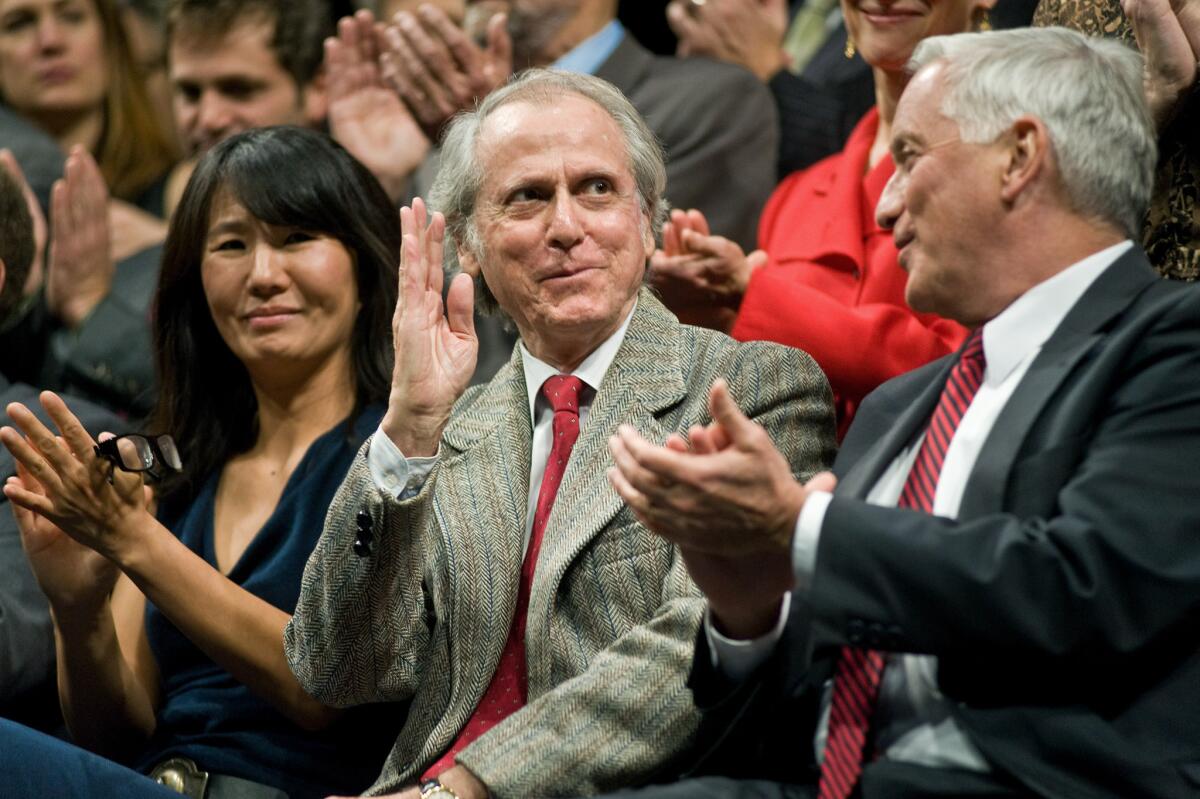Q&A: A rare interview with Don DeLillo, one of the titans of American fiction

Don DeLillo, center, with writers Nami Mun, and Walter Isaacson at the 2012 Carl Sandburg Literary Awards dinner.
- Share via
If you want to reach Don DeLillo, don’t try to email him; he doesn’t email. His preferred method of business communication is via fax. He still writes his novels on a typewriter.
That technological reticence notwithstanding, DeLillo is one of the titans of American fiction. The 79-year-old DeLillo is the author of 18 novels, including the National Book Award-winning “White Noise” and the acclaimed bestsellers “Underworld” and “Libra.” In 2004, in a high-profile get, the Ransom Center acquired DeLillo’s papers; in 2015, he was awarded the National Book Foundation’s Medal for Distinguished Contribution to American Letters.
In his new novel, “Zero K,” Jeff travels to a remote cryogenics facility to meet his father who is preparing his dying wife, Jeff’s stepmother, for her futuristic cryogenic transformation.
DeLillo will make a rare Los Angeles appearance at Writers Bloc on May 11, where he will be in conversation with novelist Rachel Kushner.
DeLillo spoke to me by phone about “Zero K,” writing, and being of yet also apart from the world. Our conversation has been edited for length and clarity.
Your writing style is really recognizable, boiled down and intense. I wonder if you could talk a little bit about craft. When you’re sitting down and writing, how do those sentences come out?
It happens in ways that are very hard to describe because they’re not so easy to understand. I’m not sure how a sentence or a paragraph extends itself. I can’t say it’s automatic, but it all seems to happen in a kind of intuitive way. And I’ve become much more conscious of letters forming on a page, letters and words. And correspondences, not only the way they sound but visual correspondences between letters in a word, or from word to word. It’s a little mysterious. It’s as though a single printed page has not only a responsibility to meaning, but also to one’s visual sense.
Do you write on paper, or a computer with a screen? When you’re talking about the visual narrative that appears, what are you looking at?
I’ve always written on a typewriter. I do use pen and paper in a sort of auxiliary way. What happened was, in the mid-1970s my old Royal typewriter was not delivering as it always had been – it was getting a little feeble. And I bought a secondhand typewriter, an Olympia, and I’ve been using that ever since. It’s much more satisfactory because it simply prints bigger letters. And so I can see more clearly what I’m writing.
So when you wrote “Underworld” [832 pages in hardcover] was that a huge stack of typewriter paper?
It was enormous. I guess it’s at the Ransom Center, and I don’t know that anyone has counted the pages because the numbering would not be accurate, since these were first-draft pages. But the final draft, I believe, well I know it was over 1,000 pages, but I’m not sure if it was 1,100 or 1,400 – I really don’t know.
And you’ve avoided moving on to any of the word processors, or –
No I haven’t done that.
It’s interesting, because your publicist told me that you don’t use email. But in “Zero K,” they’re in the back of the cab and each person in turn is kind of stabbing at that video screen to try to shut it up [DeLillo laughs] and it doesn’t go off – clearly you’ve been in the world. How do you balance being in and of the world and maintaining a writing space away from it?
It’s an interesting question. I think I’m only slightly away from the world. I’m aware of all of these things. And of course I do have friends, and my wife uses email. So it’s never very far away. And I do use an iPad just to do research. If I need to look something up, I try there. It would not necessarily have anything to do with the work I’m doing. I might want to check the title of a movie, or the director of a movie, and so I’ll just tap some letters on the iPad.
What kind of research did you do for the science and the cryogenics of “Zero K”?
I tried to limit it. Of course I did research but I didn’t want to go overboard. At some point, quite early on, I just stopped looking at data and invented what I could, trying to stay within the limits of reality. I think the key of the cryogenic aspect of the novel is that here in this facility, there is an area called “Zero K” in which people volunteer to undergo the cryogenic process even though they are nowhere near dying. This is the essence of the novel, in a way. It’s voluntary and, to my knowledge, there is nothing like this in three-dimensional reality.
If this is three-dimensional reality, what is the reality of fiction?
I’m thinking of two dimensions of a screen or a page on which people read. We hope, writers hope, that in fact their characters are living in a three-dimensional world, first in the writer’s mind, then in the minds of readers.
When I’m conceiving a scene, do I see it in three dimensions? It’s not so easy to answer what appears to be a simple question. I see it -- I see characters, I see people, I see streets, cars -- and they seem to exist in this special level of mental reality. I could not distinguish the features of a character’s face when I have an idea concerning this character, when I see him or her in a room, and in most cases the room itself is fairly generic -- except when I’m actually describing a room -- this does happen somewhere in “Zero K” -- and then I see a room much more clearly.
You said that in your mind the characters inhabit a kind of three-dimensional space that takes shape only when you’re describing a room for a reason. Does each of your books occupy a separate space? Or is there Planet DeLillo out there, with all of them, “The Names,” “End Zone”....
I think, mentally, each book occupies a separate space. But I have only dim memories of the early work, work that ranged through the 1970s. I don’t remember very much that goes on; I can remember individual scenes, and in some cases I might have trouble even recalling the main character’s name. But things get a little clearer once we reach the 1980s and the novel “The Names.” But only a little clearer. It’s an odd process.
What kind of process am I talking about? Just the process of a writer moving away from his earlier work, and the writer’s mind becoming a little more detached from that work. Necessarily. This is one of the aspects, of course, of getting a little older.
You and Paul Auster have dedicated books to one another. Do you talk about this, the separation from older work, with other novelists?
When I talk to novelists, we tend to talk about movies. It’s true. It’s much easier to talk about. I just don’t talk much about my work with other writers, and I don’t talk much about their work. A few sentences. We’re like two characters in an old Western movie in which the main element, the main audio element is to be very laconic. That’s what happens when I talk about writing with other writers.
[long pause]
Randolph Scott and John Wayne.
Which Randolph Scott or John Wayne movie should I see?
The last movie by –- what was his name, the director who did “The Wild Bunch” -– he did an earlier movie with Randolph Scott which is very impressive. And I like to think it was Randolph Scott’s last movie, because it was at a higher level. The director’s name is Sam Peckinpah. See, I’m almost sure he directed a movie in which Randolph Scott appeared.
L.A. Times readers are going to be happy that you remembered this old movie.
I don’t remember my own novels. As long as I remember these old movies.
You were saying that you don’t think about your earlier books as much, but you’re thinking about old movies. Do you read contemporary books or watch contemporary films?
I definitely go to movies, yes. And I do read contemporary fiction, not nearly as much as I used to. I think that’s something that feels like a natural withdrawal, or semi-withdrawal. It’s just not the way it used to be. I used to devour fiction, all sorts of fiction. American, European and elsewhere. I still do, but not with the same degree of anticipation.
I still see a fair number of movies. Of course, there’s the DVD, and so many of the movies I see I do watch at home. But I do go to theaters quite regularly.
If you’re reading less voraciously than you used to, where does writing fit into how you spend your time?
It fits into how much time I have to spend. I haven’t had time, recently. I think, in the relatively near future, I will have more time, and I certainly hope to get back to writing more fiction, as well as reading more fiction.
Let me ask you one PhD-student style question, a dork question.
[Warily] OK.
There’s a character in “Ratner’s Star” named Billy Twillig, born William Terwilliger. Do you remember where you got that name?
That’s a very good question. I wanted a common name. I wanted a name that might be in cartoon, in a movie, or in a kid’s comic book. Twillig seemed right. I don’t know – “Ratner’s Star” was a very long time ago.
Let me tell you one thing that comes to mind about “Ratner’s Star.” It’s that the words in the title sort of sum up the book it is. You have the second word, star, S-T-A-R, and then you have Ratner’s, R-A-T with an S at the end, so that one set of letters in the title mirrors another set of letters. Same four letters are in both words.
What does that mean? It uh, means the author is a little unbalanced.
No, it’s a little Oulipian. Did I pronounce that right?
Yeah, that’s good. And that’s all I can say about Terwilliger and Twillig. I just don’t recall what, if anything, I had in mind, except for a name that would belong to a comic book character, or a character in nursery rhyme.
I’m sure you love all your books equally, but is there one that emerges as a favorite?
It’s very hard for me to think of a favorite. I don’t love my books. There’s a sense of satisfaction due to the fact that I’ve managed to write this many novels. But I suppose if I had to name a book that had some special meaning to me it would be either “Underworld” or “Libra.” Or “Zero K.”
Book news and more; I’m @paperhaus on Twitter
More to Read
Sign up for our Book Club newsletter
Get the latest news, events and more from the Los Angeles Times Book Club, and help us get L.A. reading and talking.
You may occasionally receive promotional content from the Los Angeles Times.








